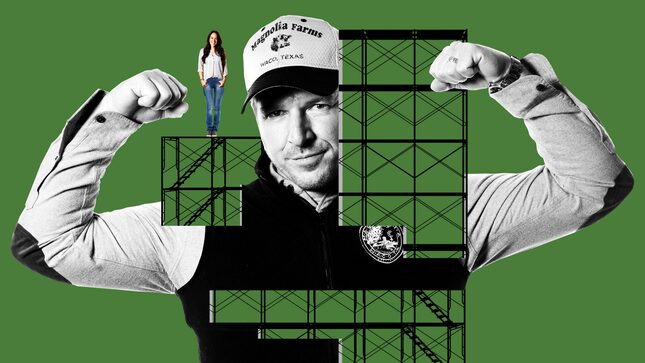
Illustration: Elena Scotti (Photos: AP, Shutterstock)
It was a busted houseboat that made Chip and Joanna Gaines famous. As they tell it, one of the camera crew who’d come to Waco to film the couple for a sizzle reel to test out their camera presence had already informed Chip that it probably wasn’t going to work—the couple was simply too flat. And then the boat arrived, in terrible condition, and Chip informed his wife they were going to live on the boat for the next six months, before realizing that it wasn’t actually seaworthy. It turns out this is something that Chip does a lot, at least judging from their memoir. He buys things without consulting Joanna, who promptly flips out, and eventually gets on board. “This is Chip Gaines—he rolls big,” Joanna told the camera crew with deep exasperation, gesturing to the wrecked houseboat.
The dynamic appealed to HGTV: “There was something about Chip’s impulsiveness, his riskiness, combined with my reaction to his riskiness and the way we worked it out as a couple, that landed us the show,” Joanna writes in their joint memoir The Magnolia Story, published by the Christian imprint Thomas Nelson. The houseboat, having served its narrative purpose, disappeared from their story; just a few short years later, the Gaineses are virtually a household name across America.
Though Joanna is often the face of Magnolia, the pair has built the brand together. She’s on the two cookbooks, the interior design book, and frequently their magazine. She’s the one with the star power, the “modern farmhouse” Martha Stewart who can convince America that shiplap is chic. Chip, meanwhile, is the supportive muscle, presiding over the renovation itself, beginning with the dusty, dirty slate-clearing of “Demo Day,” where they gut the existing space. He plays this role as the classic American sitcom dad, keeping up a steady stream of jokey hollering and antics and once, memorably, eating a cockroach. He revels in the destruction of Demo Day; he thinks avocado toast is gross and told Joanna he didn’t want a menu full of “frou-frou” food at their breakfast joint. This is their schtick: Joanna shakes her head, laughs it off, and puts the avocado toast on the menu.
But despite their comical dynamic, Chip is an inextricable part of the show’s formula, and together they’ve provided a model for HGTV to replicate endlessly, even as they’ve spun off into their own multimedia and lifestyle juggernaut: down-home general contractor husband, aspirational designer wife. They smile in the promotional imagery, leaning together like a matched set of bookends. She pulls him toward the stylish stuff they can make audiences want on a mass scale; he helps maintain their aura of accessibility.
This dynamic is wildly successful. The Gaineses have parlayed their show into bestselling books, a tourism business that draws well more than a million people a year to Waco—a town formerly associated primarily with the disastrous ATF raid on the Branch Davidian compound—and collections sold at Target, Wayfair, and through their own site. HGTV’s parent company has even given them an entire channel to play with, handing over DIY for its own renovation into the Magnolia channel. In an Architectural Digest piece about the rise of HGTV, founder Kenneth Lowe claimed that the channel “educated” the public, making it less about simply putting a roof over your head and more about, “What’s my lifestyle, what’s my family’s lifestyle, and how’s my home going to best fit and serve it, and how can I design it?” HGTV, at its most basic level, sells fantasies about domestic life, suggesting they’re attainable through material means.
And nobody does that more effectively than the Gaineses. Together they repackage a dynamic as old as consumer society: the proper arrangement for any family is a husband and a wife in their own, freestanding home, full of stylish stuff; the man builds it, and the woman fills it. An old idea, given a new paint job and resurfaced floors.
As HGTV was steadily growing, Chip and Joanna were a young couple getting their start in Waco. Both went to Baylor University, a private Christian school in the small town, but they didn’t meet until later, when Chip, already a house flipper, came into her father’s Firestone tire business. They married in 2003 and began working together on the house-flipping business that would eventually grow into Magnolia. But it wasn’t a straight path, either: Joanna opened her first shop, then closed it two years later to spend more time with her kids, essentially because God told her to, as she explains in The Magnolia Story. Ultimately, they turned the building into the office for Magnolia Homes, even keeping the sign, and got more and more sophisticated. They went from rehabbing rental properties for Baylor students to bigger and bigger flips, driven by Joanna’s increasing design savvy.
“We think it’s unique that you’re a husband and wife team,” Joanna recounts her 2012 call with producer Katie Neff. This has always been an essential element of their story and their offering. Joanna is the one with the vision for how this new home will meet the needs of their client’s family—and it is almost always a family—while Chip takes the lead on the actual construction. He is the one who oversees Demo Day, turning the practical business of the gut-job into a set piece of destruction, knocking out walls and ripping out cabinets, and even crashing through sheetrock.
-

-

-

-

-

-

-

-

-

-

-

-

-

-

-

-

-

-

-

-

-

-

-

-

-

-

-

-

-

-

-

-

-

-

-

-

-

-

-

-








































